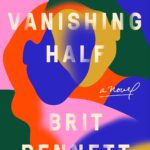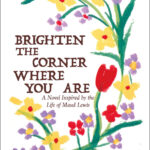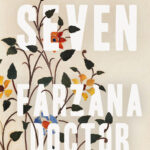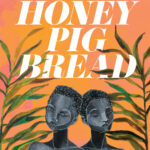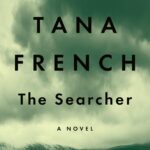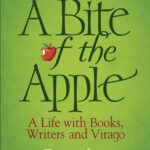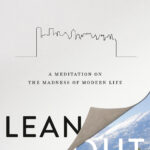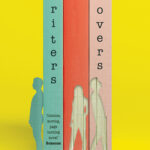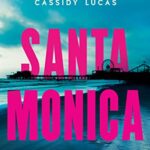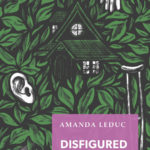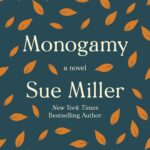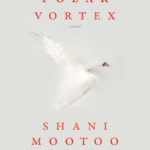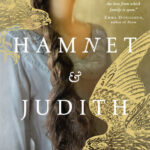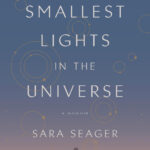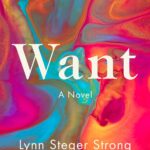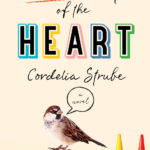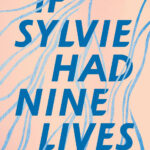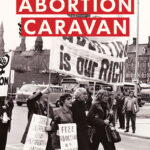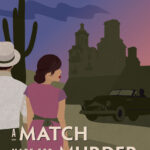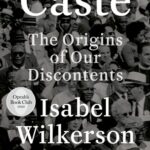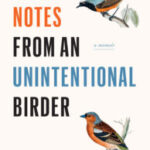January 13, 2021
Gleanings

- But this year, the ritual of school drop-off has evolved into the most important social space in my life.
- If last year proved anything, it is that readers are devoted to the printed word and that booksellers, publishers, festivals, and other stakeholders are resilient and flexible in their desire and ability to continue getting books into the hands of those who want them.
- Does that tell you something? I just decided to do it. I was feeling desperate. I thought, Why have I done all these things for others, all these other things? I’ve written a chunk of this thing, but it’s not enough. So there was the chocolate bar bribe. There was the writing jar hack. And the desperation.
- Let’s not forget the surging river as the ice melts in spring.
- But whatever superpowers of fortune telling or planning that I lack, I’ve decided I make up for with the superpower of optimism.
- And while I didn’t plan out the book that would usher in a new year of reading for me, it turns out that I could not have chosen a better one to set the tone for 2021.
- 2020 was also the year in which I learned about mending, tending, and extending.
- I like post-apocalyptic literature as much as the next guy. Just not… now.
- Today I awoke with a happy sense of anticipation, resolved to live through 2021 bravely, gallantly; as an adventure.
- Yesterday a cousin sends pictures of alpine snow heavy on branches, mountains, rooftops, and me here in the rain feeling snow envy…
- I was always glad to see people out walking, moving, striding along, whether with a friend or alone.
- Once you’ve drunk tea from a handmade mug, no ordinary, mass made one will do.
- I once took apart an essay and put it together in a much better way, all while doing the backstroke
- We are here, I say to myself, what can we do with what we have?
- It’s not how many you read that counts. It’s that you read that counts – and it counts so very much.
- Anyway, I’d like to start a New-New Year’s tradition. Let’s not look forward, let’s fucking look BACK. Every year, on December 31st, let’s count our damn blessings.
- “2020 will begin on a high note,” I wrote at the end of 2019’s “Year in Reading” post. As far as reading goes, at least, I wasn’t wrong.
- It’s funny that they’re called English muffins because the only place we ever ate them was in Florida and Bermuda when we visited our grandparents.It’s funny that they’re called English muffins because the only place we ever ate them was in Florida and Bermuda when we visited our grandparents.

January 11, 2021
Imperfection is a Privilege

The revelation I had last night when I was reading Ijeoma Oluo’s Mediocre: The Dangerous Legacy of White Male America, is that imperfection is a privilege. Imperfectionism being the gospel I espouse in my blogging course and elsewhere: “There is no place for perfectionists in the blogosphere. Blogs are inherently raw, wild and unpolished. The important thing is to write the best you can, get to Publish, and then onto the next post. There will be spelling errors, and sloppy grammar, and things will be formatted weird. You’ll get facts wrong, and often you will change your mind. (Ideally, you should always be changing your mind—or at least entertaining the possibility.”
The privilege of being able to be imperfect, sloppy, raw and unpolished in public and still be taken seriously—that’s what Oluo’s book is all about. But it’s relevant in my work too, which is mainly with white women, for whom overcoming the constraints of perfectionism is a challenge. But it’s doubly a challenge for people of colour, the demand for perfection coming from within and without, from a white supremacist society ready to jump on any imperfection as a confirmation of racist bias.
So what to do that that, I wonder? To recognize it first is essential, but of course, it is not enough. What else? To do my part to combat white supremacy, to help make a world where people of colour are as free to make typos as I am. Part of the work I do to this end involves reading works by writers of colour, and insisting on their excellence, because, as Mediocre shows, our definitions of excellence tend to be defined by white guys, and I wish to challenge that. EXCEPT that it takes us right back to where we started, where writers of colour are not permitted the same latitude as those who are white. The pressure for excellence is enough to keep a writer from writing forever, which so many people who started blogs and them quit them very well know.
How about to create space then, for writers to emerge and learn and grow? I have decided that starting now, I will reserve one space in each of my courses for people of colour. To continue to insist that imperfection is for everyone—because what is imperfection if not the right to be human after all?
January 7, 2021
What I Read On My Christmas Vacation

It’s my favourite thing! Time to read! This December, I took a nearly two-week-holiday from the internet AND from the new releases that occupy most of my reading life to indulge in the titles that have been gathering dust on my shelves for one reason or another, books that are a bit dated, which seem like work, for which there does not seem to be any great occasion to finally pick up and read, and yet I keep them around, waiting for the moment. And that moment is now!
Though Michael Christie’s Greenwood is not quite that kind of book. I bought this one last summer after three excellent booksellers (Kathryn from Lighthouse Books, Allison from Beggar’s Banquet and Shelley from Blue Heron) had cited it as a favourite, but it’s kind of long, and it’s written by a guy, and I was just not that interested, even after Stuart himself had read it, and he made me promise I would read it too (because I have this obnoxious habit of not reading the books he’s read, figuring that he’s read it for both of us). And so it was the first book I picked up on the break, and was it ever wonderful. Stuart describes it as “like Cloud Atlas, but less annoying,” and I just found it enveloping, and rich with hope, and such a marvelously bookish book. Three of out of three superstar booksellers AND Stuart can’t be wrong.
I started reading Greenwood as I picked up Braiding Sweetgrass, by Robin Wall Kimmerer, which I feel like I’m the last person on earth to finally read, and I’ve opted to read it bit by bit instead of all at once, which has the interesting effect of the book being in conversation with whatever else I’m reading, especially Greenwood. Anyway, I am about halfway through now—this is not a book to be rushed—and enjoying it very much.
Something to be read at a faster pace, however, is Agatha Christie’s (no relation to Michael, as far as I know) Crooked House, which I bought secondhand because our family had been reading Marthe Jocelyn’s middle-grade Aggie Morton series, based on Christie’s early life and her works. (Read Jocelyn’s “6 Reasons to Hook Your Kid on Mysteries”) and the fact that I’d never read an Agatha Christie book was certainly an impediment to me fully appreciating what the Aggie Morton series was up to. And I really enjoyed it! Light and fun. I am going to pass it onto my 11 year old to read next.
William Trevor’s Death in Summer was my next read, which also kicked off my focus on Ireland (though the book itself is not explicitly set there, but it’s where the author comes from). I read my first William Trevor novel the summer before last, the super weird Miss Gomez and the Brethren, which I’d discovered in a provincial park camp store and bought for a dollar. William Trevor’s novels (so far…) are so absurd and a bit psychologically grotesque, unflinching in regards to class tensions, and I love them. In this one, a woman dies suddenly, and the question arises of who should care for her 4-month-old baby, which seems more pressing than grief since the woman’s husband is incapable of feeling and never really loved her anyway, and then one of the candidates for live-in caregiver (definitely inappropriate) becomes obsessed with the father, and starts haunting their property, culminating in the baby’s snatching. ACK!
Something lighter, I supposed, after murder and summer death, so I picked up The Mysterious Disappearence of Leon (I Mean Noel), by Ellen Raskin, whose The Westing Game has been a favourite of mine for years. She was also an illustrator and wrote many picture books (and designed the cover for the first edition of A Wrinkle in Time!) and her illustrations appear in this book, which, like all of her other novels that I’ve read, sadly are not as good as the The Westing Game, which was just as silly but had a certain heft. Not so this one, but it was funny, enjoyable, and a quick read.
And then I read Rebecca Solnit’s A Book of Migrations, about her travels in Ireland. I bought this book in 2014 when my local bookshop was going out of business so everything was on sale and I was obsessed with Solnit after reading The Faraway Nearby, but I didn’t feel any real connection to the subject (in spite of my strange Irish name), so never read it, but I should never have underestimated the capacity of Solnit’s writing to be interesting, I loved this book, which was an exploration of Irish history, geography, British colonial, home and rootlessness, and more.
I got three Sue Miller books for Christmas after becoming obsessed with her Monogamy this fall, and The Distinguished Guest lived up to my hopes that her other books would be as good. (I have since also read The Good Mother. OMG, Sue Miller is amazing!!) It’s hard to say what Miller’s novels are about, exactly, to take such a reductive approach, when they’re such a slice of rich, full loves. In The Distinguished Guest, an elderly woman ailing from Parkinson’s who found late-in-life fame as a memoirist—writing about her marriage which dissolved as she and her ex-husband, a minister, disagreed about how their church would support the civil rights movemen, with her husband supporting radical activism, as Lily took a more measured, middle class approach—comes to stay with her architect husband and his wife, the son finding decades’ old resentments rising to the surface. There are no peripheral characters in this novel, each and every one flawed and complicated, and real.
And then, inspired by the Solnit book, I picked up The Dancers Dancing, by Éilís Ní Dhuibhne, which has been sitting in my shelf even longer. I don’t know I waited! Set in 1972 as a group of students from Derry and Dublin spend a month in rural Donegal, ostensibly to learn Irish, the book was such a delight. The novel was a finalist for the Orange Prize in 1999, and it’s richly innovative in terms of point of view, the most amazing omniscience. If you like Derry Girls, you will love this book, which is not like Derry Girls that much, but it scratches the itch, you know?
My final Irish selection was Elizabeth Bowen’s first novel The Hotel, which was funny and delightful in places (the part where the clergyman dares to use the bathroom that had been exclusive to Mrs. Pinkerton (including the loofahs!) but in the end I was glad to be done with it, because it was one of those twentieth century novels in which characters talk around around the thing which cannot be articulated, and I eventually cease to care. Still, I like Elizabeth Bowen very much.
And then! I returned to Natalia Ginzburg, whose work was part of my holiday break last year. I bought The City and the House after reading Melanie’s review, and really really enjoyed it. About a group of friends whose connection falls apart after one of immigrates to America, and the house where they’d all spent time is sold, the book is epistolary and the letters were a bit awkward initially (lots of exposition, unnaturally so) but then started to flow so marvellously. I particularly loved that these friends were at mid-life, because I don’t think we read a lot of stories like that. Yes, this is definitely not an uplifting read (everything that could go wrong tends to) but I really loved it.
I read Penelope Fitzgerald’s story collection The Means of Escape after that. And isn’t it funny how sometimes a book arrives at the very wrong time? I picked up the book a few years ago, and found the first story difficult and impermeable, but I think I just wasn’t in the right frame of mind, because all this time later, the story went down a charm, and I enjoyed the collection very much, and the wide range of Penelope Fitzgerald’s approaches to fiction. How can all that come from one mind?
The Fire Next Time was James Baldwin was after that, and I’ve never read James Baldwin before. But he’s the kind of writer whose words are so part of the atmosphere we breathe that so much of the book, right down to exact phrases, were familiar to me. And what can a person really say about James Baldwin, in all his brilliance, eloquence, generosity and righteous anger? The book is wonderful, and (sigh) as timely as ever.
And then I read The New House, by Lettice Cooper, a Persephone Books edition that I bought somewhere used. Published in 1936, it’s basically about everything I’ve spent the last year wondering about, about power, society, and how things ought to work. Cooper was a socialist and her point of view comes across in the novel, but is also interrogated—what happens when a woman refuses to be selfish, for instance? Are there instances in which looking out for one’s self is necessary? It was kind of an alternative twist on Howards End, a grand home being sold as modern estates are popping up across the countryside, and there is a generational divide, a sense that something is being lost, except that “something” involves terrace slums with eight people sharing a bedroom with an outside toilet, while the middle classes fret about being down to two servants. It’s a book that is a bit too informed by ideas, but also Cooper is uncertain enough about those ideas (and still curious) about them that the effect is not off-putting. And she also does a marvelous job at making the most unsympathetic characters human and real and relatable. I absolutely loved it.,
January 5, 2021
Gleanings
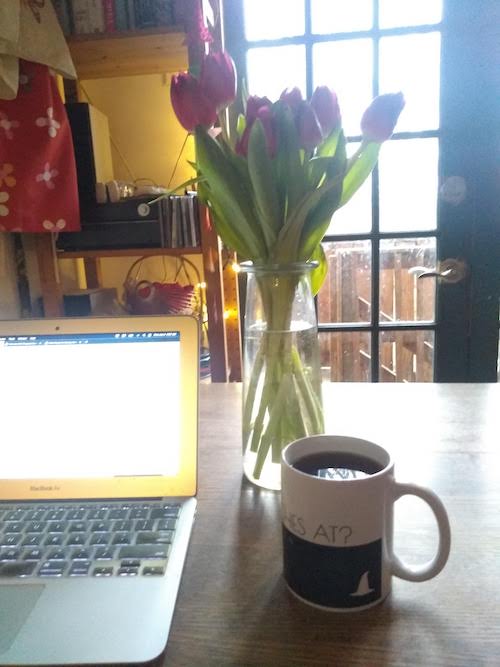
- If you’re swimming against the current, you’re acting with purpose. Effort can be clarifying.
- The question becomes, how do we keep the essence of our traditions, while allowing them to morph and evolve into something new?
- Even in the darkest dark, you will see, there is shimmering light ahead. Trust me, for I am a dreamer. I’ve missed you, too.
- COVID-19 has made me grateful that I’m a Psychrolute.
- Spread love, preach peace: Be a light.
- It’s all really about attitude and we all have so much to be grateful for.
- Is it an accident that two of my favourite books of the past year both address the concept of receiving or claiming credit? (No.)
- Try not to die before Armistice, okay?
- I’m in it for the practice. The process.
- I’m closer to the ground. And my spirit is closer to the sky.
- It was a painless process, not like the stocks, and I am a better person for it.
- If it’s so trivial, why do so many men become so enraged when a woman expresses the desire to be known as ‘Dr X’?
- I am all too aware that there are things my husband can do now, that too soon he will no longer be able to do. I am aware, but I am still not taking notes.
- The times have caused us to recognize privilege and abundance of resources that are not accessible to everyone because of the systems that have shaped us for generations – colonialism, capitalism, racism, and the patriarchy./ We can find ourselves holding all of that reality, all the hope for transformative change, all the despair and all the love, all the fear and all the joy, all at once.
- Sometimes I give myself really bad coffee jitters on purpose, just to feel something.
- We shouldn’t be deeply embarrassed if we play a wrong note; we should be deeply embarrassed if we play an entire concert in the pursuit of perfection, forgetting our true purpose: to connect with each other.
- Stitching the grammar of rocks into cotton, making a trail of ancient writing for a friend living so far away it might be another time, another epoch altogether.
- I don’t tune out the din, I am learning to be with it.
- And that is how Fred and I come to spend the better part of our first evening together in the bar of The Four Seasons Hotel, me drinking fine brandy and tea and eventually ordering a cheese plate and salad, bits of which I lovingly shove through the wires of his cage on the seat next to mine

January 5, 2021
Our Darkest Night, by Jennifer Robson

In her first four novels, Jennifer Robson proven herself as a master of popular historical fiction, her books about strong independent women’s self-discovery against a backdrop of World Wars 1 and 2, weaving fascinating historical detail (Robson holds a doctorate in British economic and social history from Saint Antony’s College, University of Oxford) with scintillating narrative. Her books are huge bestsellers, and many writers, having achieved that kind of success, might determine that they’d found their formula and should probably stick to it, but not Robson, whose smash hit fifth novel The Gown did something a little different, set in 1947 as Queen Elizabeth and Prince Phillip, bringing to light stories of craftspeople who’d worked the embroidery on the wedding dress and posing vital questions about the devaluing of craft and art in general that tends to be created and appreciated by women.
And now, two years on, Robson—who: full disclosure, is a friend of mine!—has continued to demand more of herself as a writer and also of her readers, releasing Our Darkest Night, which I read on New Year’s Day and think is her finest novel yet. Set in World War Two Italy as Nina, a secular Jew, leaves her home in Venice to hide in the countryside, disguised as a the wife of Nico, a Catholic farmer, as Italy’s fascist government continues to escalate deadly laws targeting the country’s Jewish population—her father has already lost his medical practice, she is not permitted to study, local Jewish associations are being called on supply officials with lists of people they’re connected with.
And so Nina agrees to go, desperately missing home and her family, and Robson does a wonderful job of creating a beautiful dynamic between them of respect and friendship…that has the potential to blossom into something more. The goodness of both these characters and the relationship between them creating a necessary balance to the backdrop of their story, the cruel and brutal reality of racism, persecution, and genocide. Robson doing nothing to blur the sharp edges of the truth of these matters, their violence and devastation. This is not an easy read, but to make it so would be to dishonour the stories of the real people who lived through and were victims of the Holocaust. And how does a writer whose novels feature plucky heroines and smoochy covers manage to do justice to the weight of the history she is telling? But Robson does, deftly, gorgeously.
Nina isn’t plucky—she’s a survivor. And I was trying to think of what the distinction might be exactly, which perhaps is that she comes to the story without naivete and with such a profound sense of who she is and where she comes from—there is a gravitas to her boldness that makes her absolutely unpluckable. She’s a remarkable fictional creation, and Our Darkest Night is a masterpiece.
January 4, 2021
Trying to Catch a Star?

- The Montreal Gazette calls Waiting for a Star to Fall “Subtly complex, this romantic drama is tailor-made for the #Metoo age.”
- From “BA Bookshelf” on Instagram: “As a reader who is far past the age of 23, I wanted to reach into the pages and shake Brooke by the shoulders. I wanted to tell her: I’ve seen this story and I know how it ends! But, I didn’t.”
- From novelist Kelly Duran: “With her witty and crisp narrative style, Clare delivers a thought-provoking and timely read that may have you shaking your fist in frustration while nodding with understanding.”
- My interview on the GET LIT radio show with Jamie Tennant
Coming up:
December 18, 2020
Things I Loved in 2020
Like everyone, I’ve experienced some loss this year. Plans were cancelled, funerals on Zoom, so much uncertainty and anxiety. I posted an image yesterday of some of the signs I saw as we walked up and down the streets of our neighbourhood in the first half of the year, and I think they tell a story.
But among the many lessons that 2020 taught me, it’s that things don’t always turn out for the worst (although sometimes they do). That all those cliches about darkness before dawn and clouds with silver linings and lighting single candles and “everything is going to be okay” have some truth to them. And that there is so much to be grateful for.
I have tried my best to love the gifts that this year has delivered, and these are some of the standouts.
The Weather

Spring arrived with the crisis, and brought light and reasons to go outside, and crocuses and cherry blossoms, which is not always the case in April. The summer in Ontario was pretty beautiful. And then a cool September, which meant our children returned to school and were more comfortable in their classrooms than they might have been. Followed by an autumn more glorious than we’ve experienced in years. I loved all of it.
Getaways

We’re so lucky. I’ve been repeating this phrase all year long. Even from March-June when we were stuck in the city with no access to transit, and I’d started to doubt some of my life choices. But when in June, we felt comfortable renting cars, and a summer of fun appeared, with trips to see my family, a beautiful week at a cottage we were able to rent last minute, two fantastic camping trips, and other adventures. Access to these experiences made everything so much better.
Our Walmart Pool and other Ways to Make the Best of Bad Situation

In April, we bought an 8 foot plastic backyard pool, with a sense of how the summer might go—I love swimming, we use city pools all summer usually, and have no air conditioning—and then three days later our order was cancelled. I was devastated, but Stuart found they were still in stock at Walmart and that one arrived. IT WAS THE BEST. We were nervous originally because we share our backyard and wondered if our landlord would mind us filling the pool, which was pretty large as backyard pools go. But it was amazing! Brought pool blue back into my life. Perfect for cool-downs, the kids played in it, and Stuart even rigged me up a pool tether so I could kind of actually swim. It was the very best thing.
Supporting Local Bookstores

We’ve made it this far because of all the good things that kept arriving on our doorstep, from treats and flowers, to books books books. I’ve purchased from a variety of booksellers this year (and probably bought more books than ever before, which is saying something) but Queen Books has been a mainstay, and they’ve been so good to me!
The Food We Ate

I wrote about this already, but 2020 was delicious.
Our Kids’ Teachers

From the longest March Break ever to the return of school in September, we’ve been so grateful for the support and community of our neighbourhood school, and of heroic staff who—like so many front line workers this year—have risen to the occasion and kept our kids safe at school. Worst fears about school transmission were not realized, and all that is to the credit of school staff working under extraordinary circumstances—and also to our kids, who’ve been awesome and brave, and I’m so proud of them.
My Book Launch

I was glad to launch a book during a pandemic because there was a time in the spring when I wondered if I’d launch a book at all. I am so grateful to my friends and family, to my publisher, to booksellers and readers across the country who made my launch such a rich, special and satisfying experience. And yes, especially to Hien Hoang, who made my EPIC CAKE.
My People

There’s nobody else I’d rather be stuck with for hundreds of days than these three. They’re kind, funny, understanding, fun, up for adventures, give me space, teach me things, help me out, ask good questions, and are my favourite companions. I could not love them more—and yet, I probably will tomorrow.
You

And you! For reading my work, for loving books, for loving my book, for being a good friend or neighbour, for brightening my day, for inspiring me, for making me laugh, for lending an ear, for reading my bitchy DMs, for the gossip, for the friendship, for the book recommendations, for the encouragement, for sharing parts of your life with me. I am so glad you’ve been along for the ride and I couldn’t have done it without you.
December 15, 2020
2020: Books of the Year
Books of the Year lists are so arbitrary, but they matter because they’re an excellent way to tell the stories of our reading year and also to shine some more light on those titles that moved us. (I also helped compile the Books of the Year list at 49thShelf, and you’ll notice a bit of overlap…)
These are the books that mattered to me.
The Vanishing Half, by Brit Bennett
Brighten the Corner Where You Are, by Carol Bruneau
How to Lose Everything, by Christa Couture
Seven, by Farzana Doctor
Butter Honey Pig Bread, by Francesca Ekwuayasi
The Searcher, by Tana French
A Bite of the Apple, by Lennie Goodings
Lean Out: A Meditation on the Madness of Modern Life, by Tara Henley
Writers and Lovers, by Lily King
Santa Monica, by Cassidy Lucas
Disfigured, by Amanda Leduc
Monogamy, by Sue Miller
Polar Vortex, by Shani Mootoo
Hamnet and Judith, by Maggie O’Farrell
The Smallest Lights in the Universe, by Sara Seager
Want, by Lynn Steger Strong
Misconduct of the Heart, by Cordelia Strube
If Sylvie Had Nine Lives, by Leona Theis
The Abortion Caravan: When Women Shut Down the Government in the Battle for the Right to Choose, by Karin Wells
A Match Made for Murder, by Iona Whishaw
Caste: The Origins of Our Discontent, by Isabel Wilkerson
Field Notes from An Unintentional Birder, by Julia Zarankin
December 15, 2020
Gleanings

- I felt the thrill of learning that this new-to-me author had even more titles in the library than Carolyn Keene!
- It took many years of negotiating before we were able to settle on a Chrismukkah mood board that met all of our needs; it remains a work in progress.
- “Lucky in cards, unlucky in love,” she’d say to us all, peering over her reading glasses.
- How to do you say “wind chime” in Czech?
- But it’s about flowers so every time my hand reaches to pull it off a shelf and place it in a thrift-shop-bound box, it whispers but I’m about flowers… don’t you want to know about flowers…
- What’s Christmas without kids? How often have I heard that?
- I love the “yin time” of winter. It’s a time to drowse and dream, to spin stories and commune with other writers, dead and alive. Rest. Refresh. Renew.
- The films are at their best when they channel what was best in le Carré’s novels: the moral ambiguity and the reality that even the best intentions can become degraded as a result of misplaced ideological faith or institutional corruption.
- The world is weird. A mile long lineup of people, six feet apart, in surgical masks. And there we were, singing Blondie songs, sharing stories, and trying to make it all feel less weird.
Do you like reading good things online and want to make sure you don’t miss a “Gleanings” post? Then sign up to receive “Gleanings” delivered to your inbox each week(ish). And if you’ve read something excellent that you think we ought to check out, share the link in a comment below.
December 14, 2020
Enough
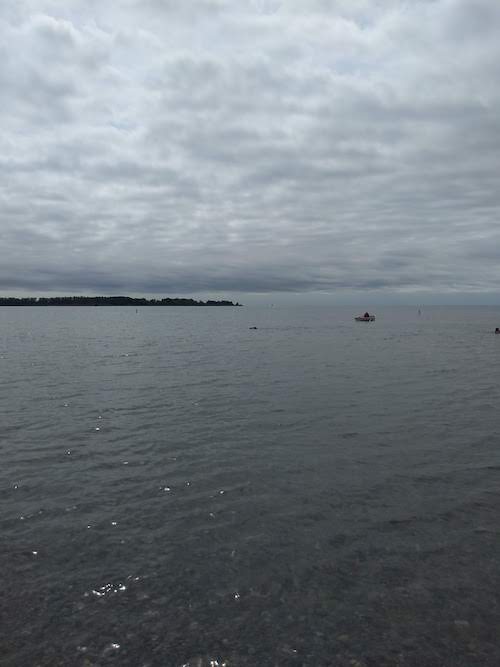
My word of the year, I have realized, is ENOUGH. Yes, of course, like, enough already. I’ve definitely had enough. We’ve all had more than enough of bad news, death and sadness, loss and heartache. Enough as in too much.
Enough as in, seriously? How much more…
*
The spot right in the middle of this photograph is me, swimming back and forth across the Ward’s Island Beach one beautiful Wednesday in late August. A day that kept threatening to storm, whose breeze almost made swimming untenable but then it was warm enough, and the lake was warm too, and I swam.
Until March, I’d been swimming daily, but then after that very little, except for our week in Haliburton in July (what a gift) and dips in our amazing 8 foot plastic pool all summer long (never has a $77 purchase from Walmart delivered more magic). And I am not complaining. To have had a holiday. A backyard. $77 to spend. We have so much more than enough.
But I still wondered, as I was swimming under that big moody sky back in August, when I would next be able to swim again?
And then the thought that crossed my mind: “But I am swimming now. And maybe that is enough.”
*
2020 has taught me everything I’ve ever known about living in the moment, about not jumping too far into an unknown future. Which is not much, to be fair. And these are lessons I needed to learn even at the best of times, and it has been somewhat edifying to realize that nobody actually knows what’s going to happen next, even the people who know the universe right down to its most essential particles. But I find that really exciting, actually. Even during the most terrifying moments I felt in March and April, it was not lost on me what it means to have impossible things become possible, how expansive and amazing that actually is.
*
To meet the moments as they come has been my intention through much of this year, a year when I grappled with anxiety attacks, so much fear and loss of control. To just breathe, and be present, and acknowledge the totality of experience. And how much enoughness and more-than-enoughness is to be found in such an experience—to have enough food, enough shelter, enough money to buy my kids shoes. Fulfilling work that we can do from home. The sustaining enoughness of our neighbours and community, of nature, of trees, and the sky. Friends and family. Artisanal cheese.
I have always been fortunate to have not just enough but also a good sense of what enoughness is—our apartment is enough, our relatively modest salaries are enough because our expenses are low. This beautiful, ordinary life is enough.
But never before has enough felt like such abundance.
Against the bleakest backdrop I’ve ever set my eyes on, I’ve spent so much time this year counting blessings, tallying up just how lucky we are.
Enough. Enough. So much enough.
Such dizzy, dazzling gratitude.
